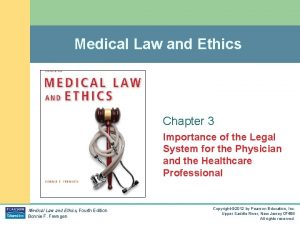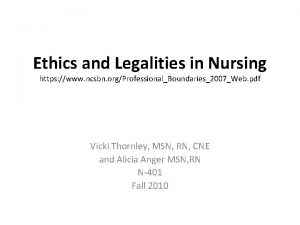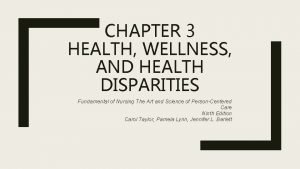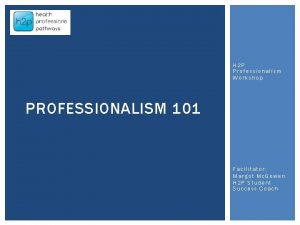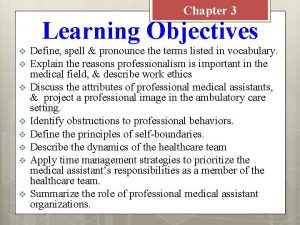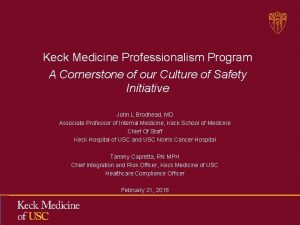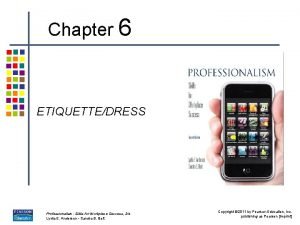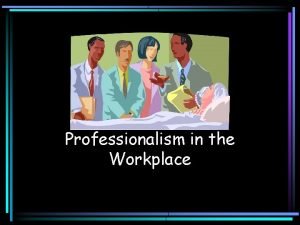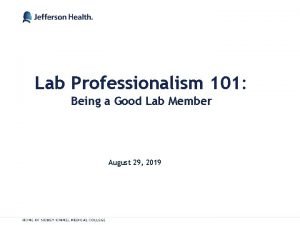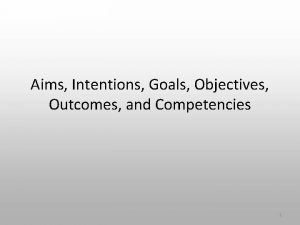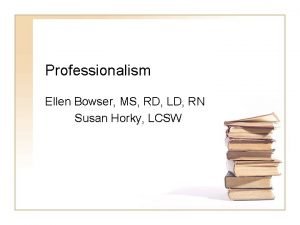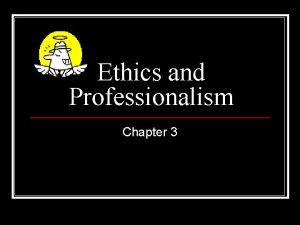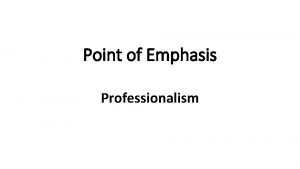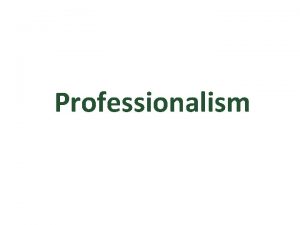Chapter 3 Laws Ethics and Professionalism in Health





































- Slides: 37

Chapter 3: Laws, Ethics, and Professionalism in Health Care Copyright © 2012 Wolters Kluwer Health | Lippincott Williams & Wilkins

Treating Patients With Dignity • Sometimes health professionals get so wrapped up in the scientific principles of healthcare that they forget they are dealing with human beings. • Why is this? Copyright © 2012 Wolters Kluwer Health | Lippincott Williams & Wilkins

Treating Patients With Dignity • Physicians, nurses, and other allied health personnel study very hard to gain the technical skills to treat patients. In their effort to focus on diagnosing and treating illness, health workers sometimes forget to treat the patient as a human being. • Physicians, nurses and other allied health personnel deal with sickness, death and tragedy on a daily basis. To protect themselves emotionally, these workers sometimes become some callous Copyright © 2012 Wolters Kluwer Health | Lippincott Williams & Wilkins

How do we as Health Care Professionals Sometimes Dehumanize Patients? Copyright © 2012 Wolters Kluwer Health | Lippincott Williams & Wilkins

• We take away their clothes and give them a generic (often immodest) hospital gown. • We give the patient a wrist band with a number that is often a substitute for their name. • We take away their jewelry and other personal items that set them apart as an individual. • We sometimes unnecessarily restrict family access. • We make them adjust to the hospital’s schedule, instead of the opposite. Copyright © 2012 Wolters Kluwer Health | Lippincott Williams & Wilkins

Ethics and Morality • Ethics is a set of moral principles and a code for behavior that govern an individual’s actions with other individuals and within society. *(Study of right and wrong) • Morality is what people believe to be right and good, while ethics is a critical reflection about morality. *(Personal standards/beliefs of right and wrong) • Different cultures have different moral codes. Thus, there are no universal truths in ethics because it is difficult to say that customs are either correct or incorrect Copyright © 2012 Wolters Kluwer Health | Lippincott Williams & Wilkins

Law • Laws are brought about by tension, agitation and conflict by dramatic situations. • Laws are societal rules or regulations that are obligatory to observe. • Who has constitutional authority to create and enforce laws? Copyright © 2012 Wolters Kluwer Health | Lippincott Williams & Wilkins

Law Continued • Laws protect the welfare and safety of society, resolve conflicts, and are constantly evolving. • Laws have governed the practice of medicine for over one hundred of years. • Some examples of laws that protect society are DUI laws, safety belts, child car seats and bicycle helmets. Copyright © 2012 Wolters Kluwer Health | Lippincott Williams & Wilkins

Bioethics • Bioethics refers to the moral issues and problems that have arisen as a result of modern medicine and medical research. • Ethical and bioethical principles can be personal, organizational, institutional or worldwide. Copyright © 2012 Wolters Kluwer Health | Lippincott Williams & Wilkins

Question: • If it’s legal it’s morally correct. Right? Copyright © 2012 Wolters Kluwer Health | Lippincott Williams & Wilkins

Bioethics • Issues in bioethics are usually life-and-death issues! • For example: Should medications known to be effective, be withheld from homeless or incompetent people because they don’t have the means to pay, store, or manage the medication properly? Copyright © 2012 Wolters Kluwer Health | Lippincott Williams & Wilkins

Comparing Law and Ethics • Law, ethics, and bioethics are different but related concepts. • Laws are mandatory to which all citizens must adhere or risk civil or criminal liability. • Although there are no penalties for not following the principles of ethics, there are consequences to self, organizations and the community at-large. Copyright © 2012 Wolters Kluwer Health | Lippincott Williams & Wilkins

Law • Types of Law – Public: government vs. citizens • Criminal • Constitutional • Administrative – Civil: private citizen vs. private citizen Copyright © 2012 Wolters Kluwer Health | Lippincott Williams & Wilkins

Law (cont’d) • Public vs. civil law Copyright © 2012 Wolters Kluwer Health | Lippincott Williams & Wilkins

Law (cont’d) • Types of Law (cont’d) – Tort • Wrongful act causing harm • Requires restitution-the restoration of something lost or stolen to its proper owner. Compensation for injury or loss • The primary aims of tort law are to provide relief to injured parties for harms caused by others • Intentional vs. unintentional Copyright © 2012 Wolters Kluwer Health | Lippincott Williams & Wilkins

Law (cont’d) • Kinds of torts Copyright © 2012 Wolters Kluwer Health | Lippincott Williams & Wilkins

Law (cont’d) • Types of Law (cont’d) – Assault: threat or attempt to touch a person without consent – Battery: touching a person without consent – Invasion of privacy – False imprisonment – Defamation of character- When false statements either cause a person to be ridiculed or damage the persons reputation • Libel: Written defamation • Slander: Spoken defamation Copyright © 2012 Wolters Kluwer Health | Lippincott Williams & Wilkins

Law (cont’d) • Liability and Negligence – Negligence: careless or senseless behavior resulting in harm (failure to take preventative care which resulted in an injury) – Failure to give care that is normally expected of a person in a particular position. – Ex. Falls and injuries that occur when the side rails are left down – Malpractice aka “bad practice” or “professional negligence” • Illegal, unethical, negligent, or immoral behavior • Results in failure of duties or responsibility • Ex. A physician not administering a tetanus injection when a patient has a puncture wound Copyright © 2012 Wolters Kluwer Health | Lippincott Williams & Wilkins

The Inequality of Power • Healthcare professionals exercise a great deal of power over patients. It is important to make sure that this power is never abused. • In an attempt to protect patients, many hospitals have implemented a patient’s bill of rights. Copyright © 2012 Wolters Kluwer Health | Lippincott Williams & Wilkins

• The right to know the professional status of all people providing care and the name of their attending doctor. • To receive complete information on their diagnosis and treatment. • To be given the prognosis for their illness. • To have every procedure, treatment, or drug therapy explained to them in language they understand. Copyright © 2012 Wolters Kluwer Health | Lippincott Williams & Wilkins

• To know the possible risks, benefits, and costs of every procedure, treatment or drug therapy. • To accept or refuse treatment. • To appoint a person to make decisions about their care if they become mentally disabled. • To have personal privacy. • To receive compassionate care and proper management of pain. • To seek a second opinion. Copyright © 2012 Wolters Kluwer Health | Lippincott Williams & Wilkins

Your Rights • All health-care workers have a duty to provide the best possible care for every patient. At the same time they are obligated to protect each patient’s civil, constitutional, and human rights. • Civil rights: are the basic rights held by all U. S. citizens • Constitutional rights: are the rights afforded to all citizens in the constitution • Human rights: are the fundamental rights of all people regardless of citizenship status Copyright © 2012 Wolters Kluwer Health | Lippincott Williams & Wilkins

Ethical Issues in Modern Healthcare In modern healthcare and research, conflicts arise where often there appears to be no clear consensus as to the “Right thing to do. ” These conflicts present problems requiring moral decisions, and necessitates a choice between two or more alternatives. Examples: Should children with serious birth defects be kept alive? Should terrorists be tortured to gain information possibly saving hundreds of lives? Copyright © 2012 Wolters Kluwer Health | Lippincott Williams & Wilkins

Ethical Questions, Cont. • Should a parent have a right to refuse immunizations for his or her child? • Does public safety supersede an individual’s right? • Should health care workers be required to receive small pox vaccination? • Who should get the finite number of organs for transplantation? Copyright © 2012 Wolters Kluwer Health | Lippincott Williams & Wilkins

What Are Ethical Principles, and How Do They Help With Decision Making? Ethical Principles Conflict is inevitable. Ethical principles provide the framework/ tools to resolve conflict in a fair, just and moral manner. Copyright © 2012 Wolters Kluwer Health | Lippincott Williams & Wilkins

Ethics • Ethical Principles – Autonomy-Respect a person’s right to make their own decisions – Justice-Not favouring some individuals/groups over others, treating people fairly – Nonmaleficence (do no harm)-Don’t inflict harm or cause pain or suffering, kill, deprive people – Beneficence (do good) – Veracity (honesty) – Fidelity (keep promises)-loyalty, maintaining the duty to care for all no matter who they are or what they may have done – Confidentiality-only sharing private information on a ‘need to know basis’ Copyright © 2012 Wolters Kluwer Health | Lippincott Williams & Wilkins

Law (cont’d) • Confidentiality and HIPAA – Patient’s right to privacy – Privacy rule – Protection of patient’s personal health information – Exceptions Copyright © 2012 Wolters Kluwer Health | Lippincott Williams & Wilkins

Law (cont’d) • Right to Die- a human being is entitled to end their own life or to undergo voluntary euthanasia. (Only in some states) – Living will – Durable power of attorney for health care Copyright © 2012 Wolters Kluwer Health | Lippincott Williams & Wilkins

Ethics (cont’d) • Joint Commission – Mission: improve safety & quality of care to public – Accredits health care facilities – Supports performance improvement – Established standards of care related to ethics Copyright © 2012 Wolters Kluwer Health | Lippincott Williams & Wilkins

Ethics (cont’d) • Ethics Committees – Multidisciplinary teams for ethical decision-making – Required by Joint Commission for all health care institutions Copyright © 2012 Wolters Kluwer Health | Lippincott Williams & Wilkins

Ethics (cont’d) • Professional Codes of Ethics: Common Factors – Quality of care – Primary commitment to patient – Education – Collegiality – Ethics – Collaboration – Research – Resource utilization – Confidentiality Copyright © 2012 Wolters Kluwer Health | Lippincott Williams & Wilkins

Ethics (cont’d) • Ethical Decision-Making – Rational & systematic – Based on ethical principles, not emotions or intuition – Serves patient’s best interest – Preserves integrity of all involved Copyright © 2012 Wolters Kluwer Health | Lippincott Williams & Wilkins

Ethics (cont’d) • Systematic approach for ethical decision-making Copyright © 2012 Wolters Kluwer Health | Lippincott Williams & Wilkins

Ethics (cont’d) • Ethical Dilemmas – Genetic testing – Stem cell research – Cloning – Physician-assisted suicide Copyright © 2012 Wolters Kluwer Health | Lippincott Williams & Wilkins

Professionalism • Definition and Characteristics of Professionalism – A set of values, behaviors, and relationships that form a foundation on which patient and colleague trust is formed – Self-regulation – Adherence to legal & ethical guidelines Copyright © 2012 Wolters Kluwer Health | Lippincott Williams & Wilkins

Professionalism (cont’d) • Competence – Lifelong learning – Continuing education units – Membership in peer association or professional organization – Humility & willingness to give & receive constructive criticism Copyright © 2012 Wolters Kluwer Health | Lippincott Williams & Wilkins

Professionalism (cont’d) • Professional Associations: Benefits – Continuing education classes – Subscriptions to professional publications – Access to online resources – Professional conferences, conventions, & workshops – Networking opportunities – Information on new technologies – Management tools – Ethics guidelines – Patient educational materials Copyright © 2012 Wolters Kluwer Health | Lippincott Williams & Wilkins
 Chapter 3 medical law and ethics
Chapter 3 medical law and ethics Difference between law and ethic
Difference between law and ethic Law and ethics of photojournalism
Law and ethics of photojournalism Facts about montesquieu
Facts about montesquieu Ac61-98 plan of action
Ac61-98 plan of action The principles of professionalism
The principles of professionalism Integrity and professionalism
Integrity and professionalism Macro and micro ethics
Macro and micro ethics Chapter 3 health wellness and health disparities
Chapter 3 health wellness and health disparities Chapter 1 understanding health and wellness lesson 2
Chapter 1 understanding health and wellness lesson 2 Chapter 1 understanding health and wellness
Chapter 1 understanding health and wellness No professionalism
No professionalism Domain 4 showing professionalism examples
Domain 4 showing professionalism examples Professionalism workshop
Professionalism workshop What are the 3 key elements of professionalism
What are the 3 key elements of professionalism Summarize three obstructions to professionalism
Summarize three obstructions to professionalism Professionalism skills for workplace success
Professionalism skills for workplace success Professionalism definition
Professionalism definition Professionalism conclusion
Professionalism conclusion Sales professionalism
Sales professionalism What is professionalism
What is professionalism Professionalism in project management
Professionalism in project management Professionalism conclusion
Professionalism conclusion Professionalism conclusion
Professionalism conclusion Gracious professionalism examples
Gracious professionalism examples Vanderbilt professionalism program
Vanderbilt professionalism program Professionalism: skills for workplace success
Professionalism: skills for workplace success What are the three p's of professionalism
What are the three p's of professionalism Professionalism objectives
Professionalism objectives Offensive language in the workplace
Offensive language in the workplace Professionalism is judged against a set of
Professionalism is judged against a set of Professionalism in computing
Professionalism in computing Professionalism 101
Professionalism 101 Professionalism in a sentence
Professionalism in a sentence Professional development for teachers
Professional development for teachers What is professionalism
What is professionalism Unit 3 personal qualities of a healthcare worker
Unit 3 personal qualities of a healthcare worker Four pillars of service excellence
Four pillars of service excellence
